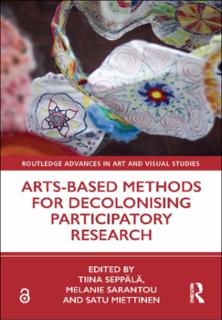| dc.contributor.author | Hovde, Sunniva Skjøstad | |
| dc.contributor.author | Smzy Maulidi, Asante | |
| dc.contributor.author | Østern, Tone Pernille | |
| dc.date.accessioned | 2021-04-26T10:05:16Z | |
| dc.date.available | 2021-04-26T10:05:16Z | |
| dc.date.created | 2021-04-25T08:51:39Z | |
| dc.date.issued | 2021 | |
| dc.identifier.citation | Seppälä, T., Sarantou, M., Miettinen, S. (Red.) (2021). Arts-Based Methods for Decolonising Participatory Research. Routlege, 59-80. | en_US |
| dc.identifier.isbn | 9780367513276 | |
| dc.identifier.uri | https://hdl.handle.net/11250/2739521 | |
| dc.description.abstract | ABSTRACT In this methodologically oriented chapter, the three co-researchers, who are part of the Malawian-Norwegian entanglements, ask themselves this question: How can we approach a Malawian-Norwegian dance education research project methodologically in a just, attentive and decolonising way? The project itself focuses on exploring the ways in which young traditional dancers in Malawi are becoming local-global Malawians in-between traditional dance and a modern Malawian identity. It is an ongoing study taking place in the context of young dancers from the cultural school Music Crossroads Malawi in Lilongwe who are trained in the dance troupe Hear Us Children, a Malawian-Norwegian music researcher and a dance researcher from a Norwegian university. We have turned to Malawian philosophy, decolonial theory and performative inquiry, and conclude that using an uMunthu participatory approach in our research has been crucial as it has enabled us to take small steps towards more just dance research—consciously seeking to be attentive towards inequities and power imbalances. First, we introduce the research context of the project, the research focus of this chapter and the collaborative and decolonial approaches used in the project. Then, we present the theoretical and methodological perspectives we are dialoguing with—Malawian philosophy, decolonial theory and performative inquiry—with an introduction to Lynn Fels’ ‘stop moments’ as analytical tools. The stop moments are then presented as an analysis of the research material. Finally, we discuss how these stop moments allow us to answer the analytical question and contribute to the development of new methodological perspectives through the lens of decolonial theory. | en_US |
| dc.language.iso | eng | en_US |
| dc.publisher | Routledge | en_US |
| dc.relation.ispartof | Arts-Based Methods for Decolonising Participatory Research | |
| dc.rights | Attribution-NonCommercial-NoDerivatives 4.0 Internasjonal | * |
| dc.rights.uri | http://creativecommons.org/licenses/by-nc-nd/4.0/deed.no | * |
| dc.title | Towards Just Dance Research. An uMunthu Participatory and Performative Inquiry Into Malawian–Norwegian Entanglements. | en_US |
| dc.type | Chapter | en_US |
| dc.description.version | publishedVersion | en_US |
| dc.source.pagenumber | 59-80 | en_US |
| dc.identifier.cristin | 1906223 | |
| cristin.ispublished | true | |
| cristin.fulltext | original | |
| cristin.qualitycode | 2 | |

